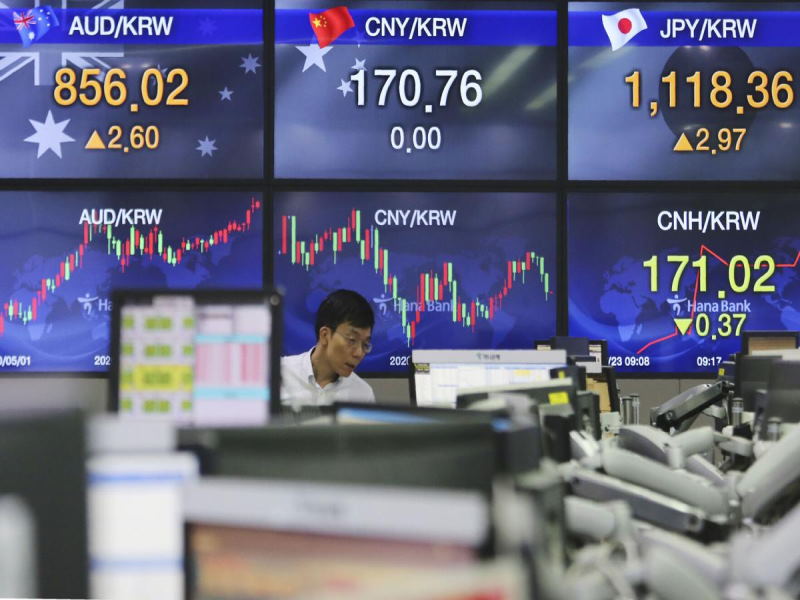Global Shares Up Amid Jitters Over US Stimulus, China Trade

Global markets and U.S. stock futures rose Wednesday amid investor concern about U.S. stimulus spending and a trade agreement with Beijing.
London and Frankfurt opened higher, while Shanghai, Hong Kong and Seoul rose. Tokyo declined.
Gold rose to a new record after a deadly explosion in Beirut.
Investors are watching the stalemate among U.S. legislators over employment benefits for millions of Americans thrown out of work by the coronavirus pandemic and spending to shore up anemic economic growth.
At the same time, news reports from Washington said Chinese and American trade envoys will meet this month to review their “Phase 1” agreement aimed at ending a tariff war. That follows President Donald Trump’s threat to discard the agreement over Beijing’s handling of the coronavirus pandemic.
Traders see that as a sign of “commitment to ensuring the agreement holds” despite escalating U.S.-Chinese tension, Stephen Innes of AxiTrader said in a report.
In early trading, the FTSE 100 in London gained 1% to 6,093.20 and Frankfurt’s DAX advanced 0.8% to 12,708.61. The CAC 40 in France added 0.8% to 4,930.04.
On Wall Street, the future for the benchmark S&P 500 index was up 0.6% and that for the Dow Jones Industrial Average was 0.5% higher.
On Tuesday, S&P 500 index gained 0.4% as a rally eased. The index is within 2.4% of its February record high. The Dow climbed 0.6% and the Nasdaq composite added 0.4% to a record.
In Asia, the Shanghai Composite Index gained 0.2% to 3,377.56 while the Nikkei 225 in Tokyo lost 0.3% to 22,514.85. The Hang Seng in Hong Kong rose 0.6% to 25,102.54.
The S&P-ASX 200 in Sydney fell 0.6% to 6,001.30 while Seoul’s Kospi gained 1.4% to 2,311.86.
India’s Sensex was little-changed at 37,691.69. New Zealand retreated while Singapore, Bangkok and Jakarta gained.
Also Wednesday, gold rose $29.20 to $2,050.90.
Investors have been buying gold and silver, usually seen as a store of value if stock prices decline. Forecasters see that as an indicator of rising unease about the global economic outlook.
The explosion in Beirut killed at least 70 people, injured more than 3,000 and flattened much of the Lebanese capital’s port. The cause of the most destructive blast in the country’s history was unclear.
Global markets have recovered most of this year’s losses as investors look ahead to the possible development of a coronavirus vaccine. Forecasters warn the rebound might be too big and fast to be sustained by uncertain economic activity as infections rise in the United States and some other countries.
Legislators in Washington are at odds over a relief package including a replacement for $600 weekly unemployment benefits that expired last week.
The number of people filing for unemployment is rising after a resurgence of infections pushed some states to reimpose controls on business.
Economists expect a report Friday to show U.S. employers added 1.8 million jobs last month, which would be welcome growth but also a slowdown from June.
For now, investors are relying on the Federal Reserve, which said last week it would keep interest rates near zero. At the same time, Fed Chairman Jerome Powell said Congress needs to take action.
“Markets are betting on the Fed picking up the slack more permanently even from temporary fiscal stimulus lapses and convulsions,” Hayaki Narita of Mizuho Bank said in a report.
In energy markets, benchmark U.S. crude rose 71 cents to $42.41 per barrel in electronic trading on the New York Mercantile Exchange. The contract rose 69 cents on Tuesday to settle at $41.70 per barrel. Brent crude, the basis for pricing international oils, gained 73 cents to $45.16 per barrel in London. It gained 28 cents the previous session to $44.43.
The dollar declined to 105.70 yen from Tuesday’s 105.72 yen. The euro gained to $1.1841 from $1.1805.



